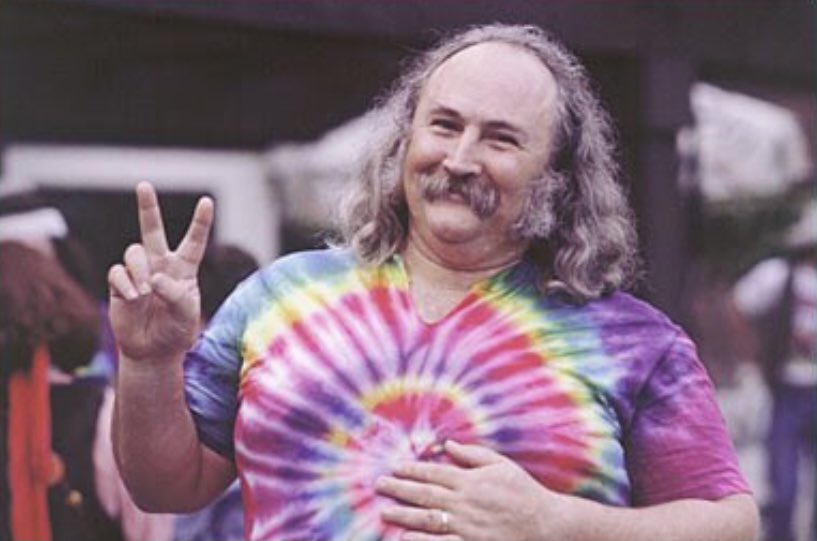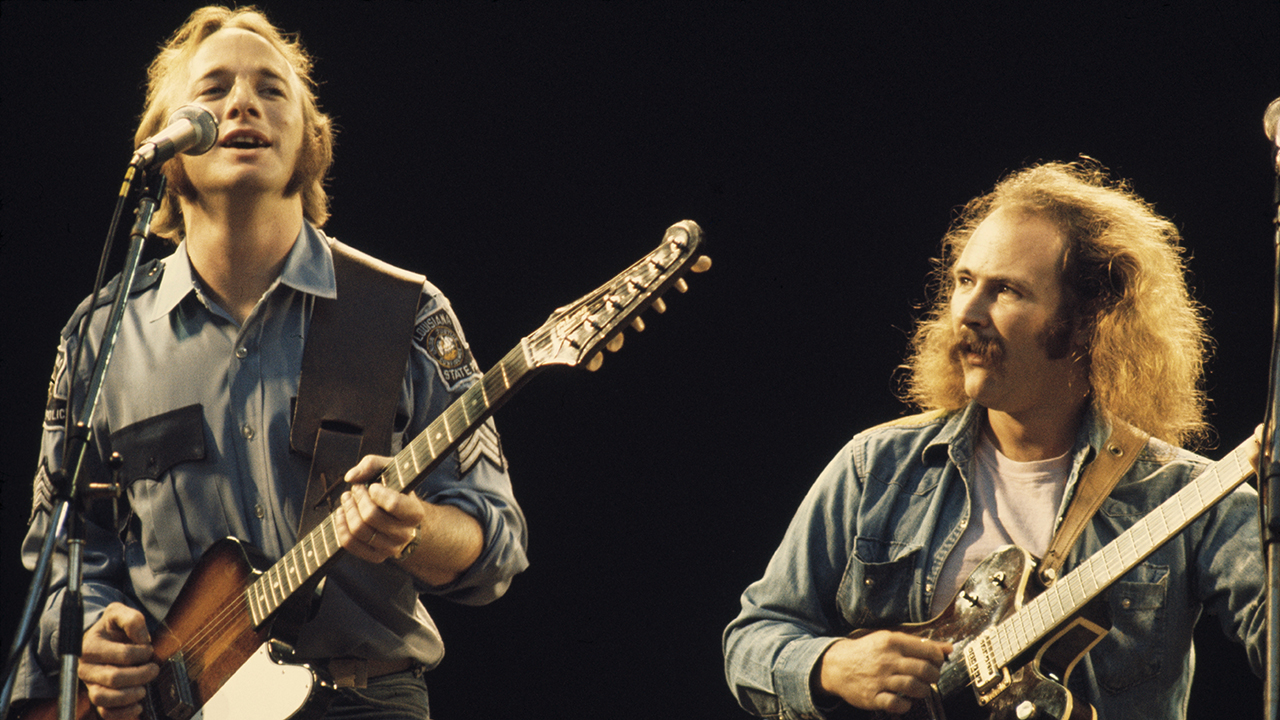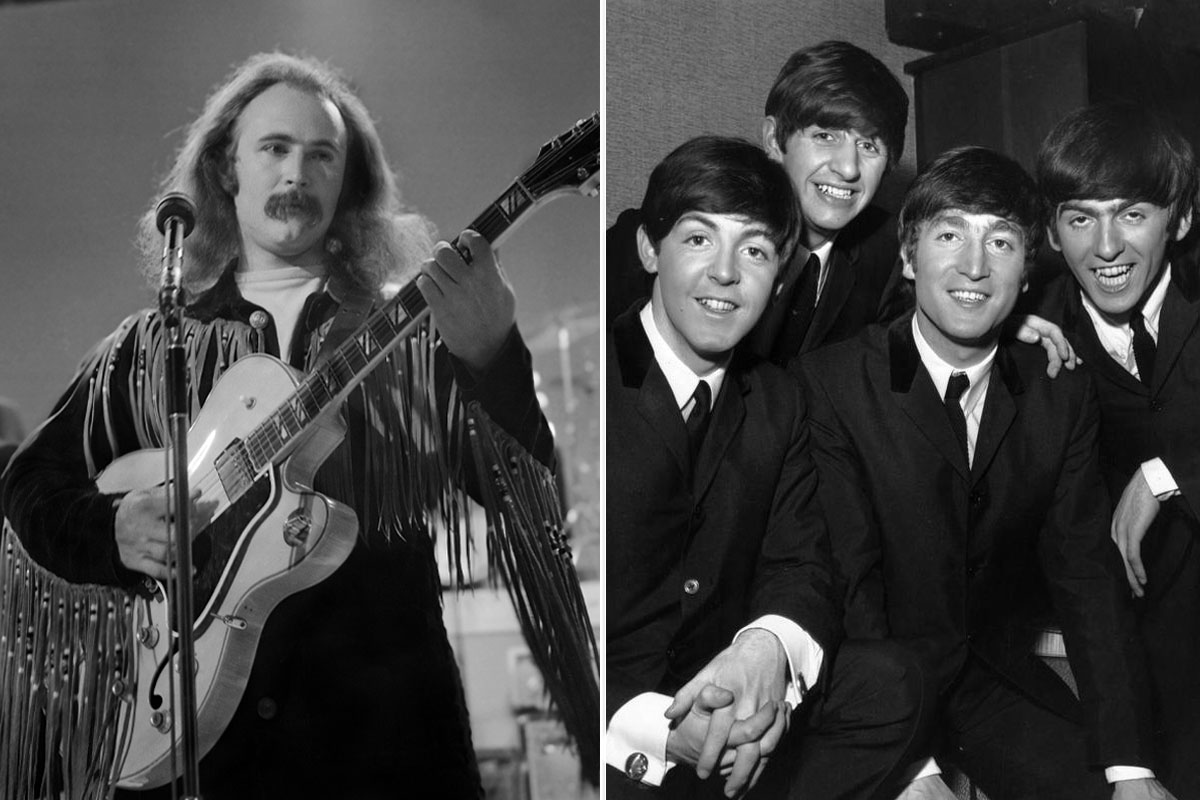Music
David Crosby of Crosby Stills Nash and Young Dead at Age 81
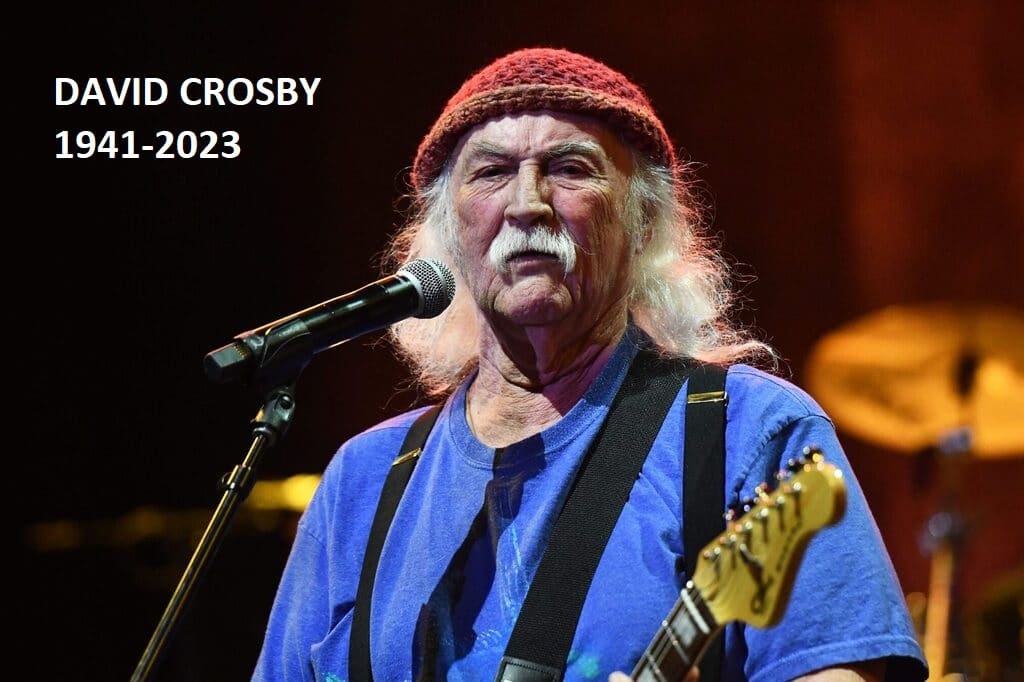
David Crosby, the brash rock musician who evolved from a baby-faced harmony singer with the Byrds to a mustachioed hippie superstar and an ongoing troubadour in Crosby, Stills, Nash & (sometimes) Young, died Thursday at the age of 81, according to several media outlets.
According to the New York Times, the musician died Wednesday night, citing a text message from Crosby’s sister-in-law. Several media outlets, citing anonymous sources, reported Crosby’s death; The Associated Press could not reach Crosby’s representatives or his widow.
Crosby received a liver transplant in 1994 after decades of drug use, and he lived through diabetes, hepatitis C, and heart surgery in his 70s.
While he only wrote a few well-known songs, Crosby was at the forefront of the cultural revolution of the 1960s and 1970s, whether triumphing on stage with Stephen Stills, Graham Nash and Neil Young at Woodstock, testifying on behalf of a hirsute generation in his anthem “Almost Cut My Hair,” or mourning the assassination of Robert F. Kennedy in “Long Time Gone.”
He was a founding member and focal point of the Los Angeles rock music community, which produced artists such as the Eagles and Jackson Browne. He inspired Dennis Hopper’s long-haired stoner in “Easy Rider,” a twinkly-eyed hippie patriarch. He was an unrepentant loudmouth who engaged in personal warfare and admitted that many musicians he worked with no longer spoke to him.
“Crosby was a colorful and unpredictable character who wore a Mandrake the Magician cape, didn’t get along with too many people, and had a beautiful voice — and architect of harmony,” Bob Dylan wrote in his memoir, “Chronicles: Volume One,” published in 2004.
David Crosby’s drug use
Crosby’s drug use left him bloated, bankrupt, and estranged. He overcame his addiction during a year in prison in Texas on drug and weapons charges in 1985 and 1986. The conviction was eventually reversed.
“I’ve always said that I picked up the guitar as a shortcut to sex, and after my first joint, I was convinced that if everyone smoked dope, the war would end,” Crosby said in his 1988 autobiography, “Long Time Gone,” co-written with Carl Gottlieb. “I was correct on the sex. When it came to drugs, I was completely wrong.”
He lived years longer than expected and experienced a creative renaissance in his 70s, releasing several solo albums while collaborating with others, including his son James Raymond, who became a favorite songwriting partner.
“Most guys my age would have done a covers record or duets on old material,” he told Rolling Stone shortly before the release of “Croz” in 2013. “This isn’t going to be a big hit. It’ll most likely sell nineteen copies. I don’t think kids will like it, but I’m not going to make it for them. I’m doing it for myself. “I have some things I need to get off my chest.”
Crosby was featured in Cameron Crowe’s documentary “David Crosby: Remember My Name” in 2019.
While his solo career flourished, his seemingly lifelong bond with Nash frayed, Crosby was enraged by Nash’s 2013 memoir “Wild Tales” (which he called “whiny and dishonest”), and their relationship devolved into an ugly public feud, with Nash and Crosby agreeing on one thing: Crosby, Stills, and Nash were done.
Crosby’s rise in the music world
Crosby did express interest in a Crosby, Stills, Nash, and Young protest tour following Donald Trump’s election as President of the United States, but his former bandmates did not respond.
Crosby rose to prominence in the mid-1960s as a member of the seminal folk-rock band The Byrds, whose hits included “Turn! Turn! Turn!” and “Mr. Tambourine Man.” At the time, he was clean-cut and baby-faced, and he contributed harmonies that were an important part of the band’s innovative blend of The Beatles and Dylan. Crosby was one of the first American celebrities to become close to The Beatles and was instrumental in introducing George Harrison to Eastern music.
Crosby left The Byrds and formed a new band due to strained relationships with his bandmates. Crosby, Stills, and Nash’s first meeting is legendary: Stills and Crosby were working on the ballad “You Don’t Have to Cry” at Joni Mitchell’s house in 1968 (Stills would argue they were at Mama Cass’) when Nash suggested they start over. Nash’s high harmony added a magical layer to Stills’ rough bottom and Crosby’s mellow middle, forming a supergroup.
Their self-titled debut album was an instant success, helping to redefine commercial music. The songs were longer and more personal than their previous releases, but they were easily relatable to an audience embracing a more open lifestyle.
Their vibrant harmonies and themes of peace and love became synonymous with the late 1960s and early 1970s. Their cover of Joni Mitchell’s “Woodstock” served as the theme for a documentary about the 1969 rock concert at which the group made only its second live appearance. Crosby had produced Mitchell’s first album, “Song to a Seagull,” in 1968 and had been her boyfriend at the time (as was Nash).
Harmony and rhythm guitar
Crosby, now sporting the drooping, bushy mustache that would define him for the rest of his life, provided harmony and rhythm guitar, and his songs reflected his volatile personality. They ranged from “Guinevere’s” misty-eyed romanticism to “Deja Vu’s” spirituality to “Almost Cut My Hair’s” operatic paranoia.
Some criticized the group for being soft-headed and self-indulgent.
“If you’re into living-room rock, fireplace harmonies, and a hint of good old social consciousness, this is your band,” said Rolling Stone, who never missed an opportunity to write about the band.
But CSN, as they were soon known, won a Grammy for best new artist and became a global touring act and brand name decades later.
The first album was a lighthearted, upbeat recording, but the mood darkened during the second, “Deja Vu.” Neil Young joined the band, having feuded with Stills while both were in Buffalo Springfield and continuing to do so.
Everyone in the band was in turmoil: Nash and Mitchell had split up, as had Stills and singer Judy Collins. Meanwhile, Crosby was so devastated by the death of his girlfriend, Christine Hinton, in a car accident that he would sob on the studio floor.
Solo artists, duos, trios
The album featured a rougher, less unified sound, was released in 1970 and was another commercial success. Within two years, the quartet had disbanded, destined to reunite and splinter for the rest of their lives.
They worked as solo artists, duos, trios, and, on rare occasions, all four simultaneously. They performed in stadiums and clubs. They were present at the Berlin Wall as the Cold War ended in 1989 and in New York for the Occupy Wall Street protests in 2011.
Crosby has toured frequently in recent years and has answered questions on Twitter with affection and exasperation, whether commenting on rock star peers or assessing the quality of a fan’s marijuana joint. He loved sailing, and aside from hard drugs, his greatest regret was selling his 74-foot boat due to financial difficulties. Among the songs completed on the boat was the classic “Wooden Ships,” co-written with Stills and Paul Kantner of Jefferson Airplane.
Crosby was born David Van Cortlandt Crosby in Los Angeles on August 14, 1941. Floyd Crosby, the Oscar-winning cinematographer behind “High Noon,” was his father. His mother, Aliph, and brother, Floyd Jr., later relocated to Santa Barbara.
Crosby grew up listening to classical, folk, and jazz music. Crosby stated in his autobiography that as a child, he used to harmonize while his mother sang, his father played mandolin, and his brother played guitar.
“I wasn’t into it when rock ‘n’ roll came in during that era, and the Age of Elvis possessed America,” he recalled.
The Beatles inspired Crosby.
His brother taught him to play the guitar, and he began performing in Santa Barbara clubs while still in his teens. In 1960, he moved to Los Angeles to study acting but dropped out and became a folk singer, touring the country before joining The Byrds. Like many other folk performers, Crosby was inspired by the Beatles’ 1964 film “A Hard Day’s Night” and decided to pursue a career as a rock star.
In 1987, Crosby married his longtime girlfriend, Jan Dance. Django, the couple’s son, was born in 1995. Crosby and Debbie Donovan had a daughter, Donovan. Crosby was reunited with Raymond, who had been placed for adoption in 1961, shortly after undergoing the liver transplant. Raymond, Crosby, and Jeff Pevar later formed a band called CPR.
“I regretted losing him many times,” Crosby said of Raymond in 1998 to the Associated Press. “I was too immature and irresponsible to parent anyone.”
Melissa Etheridge revealed in 2000 that Crosby was the father of her two children with then-partner Julie Cypher. Etheridge told Rolling Stone that Cypher carried the children Crosby fathered through artificial insemination. Beckett, one of the sons, died in 2020.
David Crosby did not assist in raising the children but stated, “If, you know, in time, at a distance, they’re proud of who their genetic father is, that’s great.”
Source: AP
Celebrity
American Who Made Social Media Threats Against Taylor Swift Detained Ahead Of German Concert

BERLIN — An American man who made threats against Taylor Swift on social media was seized before her first concert in Gelsenkirchen, Germany, and will be held in custody until her gigs there end, authorities said Thursday.
swift | AP news Image
American Who Made Social Media Threats Against Taylor Swift Detained Ahead Of German Concert
According to police, the accused stalker, a 34-year-old whose name has not been disclosed, had a ticket to Taylor’s concert at Gelsenkirchen’s Veltins-Arena on Wednesday. They stated that he was detained at event admission checks because an early assessment could not completely rule out a risk.
According to police, the man threatened Taylor and her partner on social media. They say he was detained after receiving tips from the event’s organizers.
The American superstar will perform in Gelsenkirchen on Wednesday, Thursday, and Friday as part of her Eras tour. According to authorities, a local court has ordered that the suspected stalker be detained until Saturday.
They went on to say that Swift and the audience were always safe. The event drew approximately 60,000 people on Wednesday evening and went off without incident.
American Who Made Social Media Threats Against Taylor Swift Detained Ahead Of German Concert
Before the concerts, Gelsenkirchen temporarily renamed the town “Swiftkirchen” and honored the singer on a “Walk of Fame” dedicated to local luminaries.
Taylor has plans to perform in two more German cities after Gelsenkirchen: Hamburg and Munich.
SOURCE | AP
Celebrity
Britney Spears Has A Message For Ozzy Osbourne After He Called Her Dancing ‘Sad’

Nobody puts Britney Spears in a corner.
The singer was highlighted on a recent episode of “The Osbournes Podcast,” in which Ozzy Osbourne stated that he was “fed up with seeing poor old Britney Spears dancing on social media.”
“You know, it’s sad,” the renowned rocker admitted. “Very, very sad.”
:max_bytes(150000):strip_icc():focal(749x0:751x2)/ozzy-osbourne-brittany-spears--063-07172024-1b9201fbbfc3446397693fca68a8a430.jpg)
Britney Spears | People Image
Britney Spears Has A Message For Ozzy Osbourne After He Called Her Dancing ‘Sad’
His family agreed, including his wife Sharon and older children Kelly and Jack Osbourne.
Britney, who routinely posts videos of herself dancing on social media, noticed and responded with a lengthy comment.
She began her essay by mentioning Kate Beckinsale’s 2001 film Serendipity and stating that “incredibly cruel people were talking about [Beckinsale] needs more age-appropriate content.” Beckinsale, who is in her fifties (as Britney also highlighted), has been known to confront social media bullies.
Britney then reacted to the Osbournes’ complaints. She stated that she rarely dances and responded to Sharon Osbourne’s description of her as “a poor little thing” by saying, “I’m not poor at all!!!”
Britney Spears Has A Message For Ozzy Osbourne After He Called Her Dancing ‘Sad’
“I taught dance lessons to a few adolescents last week… Spears wrote, “A lot of the kids were too thin, and some were too big.” “I know what it’s like to be judged, so it’s a ridiculous and stupid subject initially, but I think it’s important to HELP EACH OTHER and invite each other to places that help our souls to grow!!!”
Spears closed her email to the Osbournes, whom she described as “the most boring family known to mankind,” by ordering them to “kindly f**k off.”
SOURCE | CNN
Celebrity
Jack Black Ends Tenacious D Tour After Bandmate’s Trump Shooting Comment

Tenacious D, the comedic rock duo comprised of Jack Black and Kyle Gass, has postponed the remainder of their tour following Gass’ remarks about the murder attempt on Donald Trump.
On Sunday, while onstage at a concert in Sydney, Black presented Gass with a birthday cake and urged him to “make a wish”. Gass responded, “Don’t miss Trump next time,” an apparent reference to the previous day’s rally shooting, which left the former president with a damaged ear. The footage of Gass was widely shared on social media.
Jack Black Ends Tenacious D Tour After Bandmate’s Trump Shooting Comment
“What was mentioned during the broadcast on Sunday caught me off guard. “I would never condone hate speech or encourage political violence in any way,” Black wrote in an Instagram post on Tuesday. “After much thought, I no longer believe it is right to continue the Tenacious D tour, and any future creative plans are paused. I appreciate the fans’ support and understanding.”
Following Black’s statement, Gass apologized on Instagram.
“The line I improvised Sunday night in Sydney was highly inappropriate, dangerous and a terrible mistake,” the comedian wrote Tuesday. “I condemn all forms of violence against anyone. What happened was a tragedy, and I sincerely apologize for my lack of judgment.”
The band recently finished touring in the United States and Europe. Their “Spicy Meatball Tour” is set to resume Tuesday night in Newcastle. This month, they will visit most major cities in Australia and New Zealand before returning to the United States for a few chosen dates in October.
Jack Black Ends Tenacious D Tour After Bandmate’s Trump Shooting Comment
“Frontier Touring regret to advise that Tenacious D’s concert tonight at Newcastle Entertainment Centre has been postponed,” their touring firm stated on Instagram Tuesday. “Ticket holders are asked to hold onto their tickets until further information is available.”
A band representative referred the Associated Press to Black’s remark when approached for further comment. Details about reimbursements for the remaining tour dates were not immediately available.
SOURC | AP
-
World2 weeks ago
Former President Trump Survives Being Shot at Pennsylvania Rally
-
Tech4 weeks ago
Huawei Launches 5G-A Pioneers Program at MWC Shanghai 2024: Paving the Way for a Connected Future
-
Sports4 weeks ago
NBA Draft: Kyle Filipowski Withdraws Unexpectedly From The First Round
-
Tech4 weeks ago
ChatGPT Answers Undiscovered Questions and Outperforms Students.
-
News4 weeks ago
US Supreme Court Rejects Drug Deal that Protects the Sackler Family
-
Health4 weeks ago
US Health Agency Issues Dengue Virus Infection Warning

